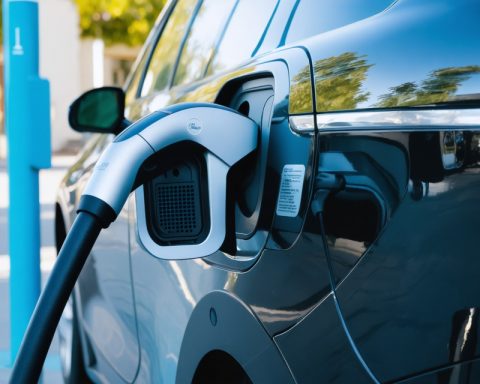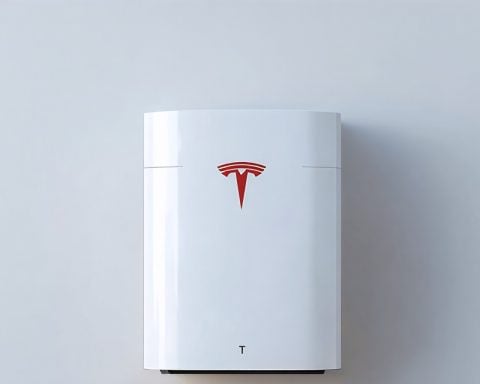Groundbreaking Collaboration in Solar EV Technology
In an exciting development for sustainable transportation, LG Energy Solution has teamed up with Aptera Motors to revolutionize the electric vehicle market with cutting-edge solar-powered batteries. This strategic alliance emerged at CES 2025, where LG, Aptera, and CTNS formalized their collaboration through a signed Memorandum of Understanding, aiming to innovate battery supply and expand their business footprint.
Battery Supply Innovations
As part of this collaboration, LG Energy Solution will provide Aptera with 4.4GWh of 2170 cylindrical battery cells from 2025 to 2031. These state-of-the-art batteries will be integral to powering Aptera’s upcoming solar electric vehicles, with the first models set to launch in the U.S. in 2025.
Manufacturing and Design Synergies
CTNS will play a crucial role in manufacturing, creating battery modules and packs that feature LG’s advanced cells for seamless integration into Aptera’s solar EVs. The design focuses on minimizing air resistance, allowing for an impressive range of 643 km (400 miles) per charge. Additionally, the vehicle’s solar panels will contribute significantly, providing daily driving power equivalent to 64 km (40 miles).
Next-Gen Battery Safety and Durability
Highlighting their commitment to safety, LG’s cylindrical batteries utilize advanced technologies such as NCMA cathodes with aluminum reinforcements and a specialized ceramic-coated Safety Reinforced Separator, enhancing durability and reliability. Mass production of the innovative 46-series batteries will commence at their Arizona facility in 2026, promising a sustainable future for green transportation.
Implications of Revolutionary Solar EV Technology
The collaboration between LG Energy Solution and Aptera Motors is poised to yield profound implications for society, culture, and the global economy. As electric vehicles (EVs) become increasingly mainstream, the integration of solar technology into this sector could redefine concepts of sustainable transport. By producing vehicles that not only rely on electric charging but also harness solar energy, the partnership aims to reduce the carbon footprint associated with traditional electricity generation.
In terms of economic impact, the creation of an innovative solar EV market may catalyze job growth within the green technology sector. The demand for skilled labor in manufacturing, battery technology, and software development for intelligent energy management systems will surge. As this sector evolves, investments in renewable energy solutions are likely to attract global financial support, further stimulating economic growth across various regions.
Moreover, the environmental consequences of solar EVs are promising. By reducing reliance on fossil fuels and promoting renewable energy use, this partnership could accelerate efforts to combat climate change, aligning with international goals set by agreements such as the Paris Accord.
Looking ahead, future trends may include enhanced integration of smart technology in vehicles, enabling more efficient energy management and fostering a culture of sustainability. As consumers become increasingly aware of their environmental impact, cultural shifts toward eco-friendly choices in transportation could strongly influence market dynamics, creating a sustained demand for such innovations in the years to come.
Revolutionizing Sustainable Transportation: The Future of Solar EVs
Groundbreaking Collaboration in Solar EV Technology
In a significant advancement for sustainable transportation, LG Energy Solution and Aptera Motors are set to change the electric vehicle landscape with their pioneering alliance focused on solar-powered batteries. This collaboration was officially announced at CES 2025, where industry leaders, including CTNS, joined forces to enhance battery supply chains and scale up their businesses.
Battery Supply Innovations
The partnership aims to deliver 4.4 GWh of advanced 2170 cylindrical battery cells from LG Energy Solution to Aptera from 2025 to 2031. These next-generation batteries are pivotal for Aptera’s upcoming solar electric vehicle lineup, with the first vehicles expected to hit the U.S. market in 2025.
Manufacturing and Design Synergies
A crucial element of this collaboration involves CTNS’s expertise in manufacturing. They will produce battery modules and packs that incorporate LG’s cutting-edge cells, ensuring optimal performance in Aptera’s solar EVs. A key design feature includes aerodynamics that reduce air resistance, allowing the vehicles to achieve an impressive range of 643 km (approximately 400 miles) on a single charge. Additionally, the integrated solar panels are designed to generate daily energy, providing the equivalent of around 64 km (40 miles) worth of driving power each day.
Next-Gen Battery Safety and Durability
Safety is a top priority in this collaboration. LG’s cylindrical battery technology includes advanced innovations such as NCMA (Nickel Cobalt Manganese Aluminum) cathodes reinforced with aluminum, alongside specialized ceramic-coated Safety Reinforced Separators. These enhancements significantly improve the durability and reliability of the batteries. The mass production of the innovative 46-series batteries is set to start at LG’s Arizona facility in 2026, contributing not only to safety but also to the sustainability of green transportation.
Use Cases and Market Impact
The partnership between LG Energy Solution and Aptera Motors not only aims to create more energy-efficient vehicles but also targets a broader shift in market dynamics. As the demand for sustainable transport options increases, solar EVs could capture significant market share, especially among environmentally conscious consumers.
Trends in Solar EV Technology
The integration of solar technology into electric vehicles is a burgeoning trend, with consumers increasingly seeking greener alternatives. As government regulations become stricter regarding emissions and sustainability, partnerships like this one will be pivotal in pushing the envelope for what is possible in electric vehicle technology.
Pricing and Availability
While exact pricing details for Aptera’s solar EVs are yet to be released, projections suggest that the combination of solar efficiency and advanced battery technology could result in competitive pricing compared to traditional electric vehicles. Consumers can expect to see the first models available for order in 2025, ushering in a new era of eco-friendly transportation.
Conclusion
The collaboration between LG Energy Solution and Aptera Motors marks a transformative moment in the electric vehicle industry, emphasizing the potential for combining solar energy with cutting-edge battery technology. As this partnership progresses, it stands to not only enhance the performance and safety of solar EVs but also pave the way for a more sustainable future in transportation.
For more information about sustainable technology advancements, visit Aptera Motors.













